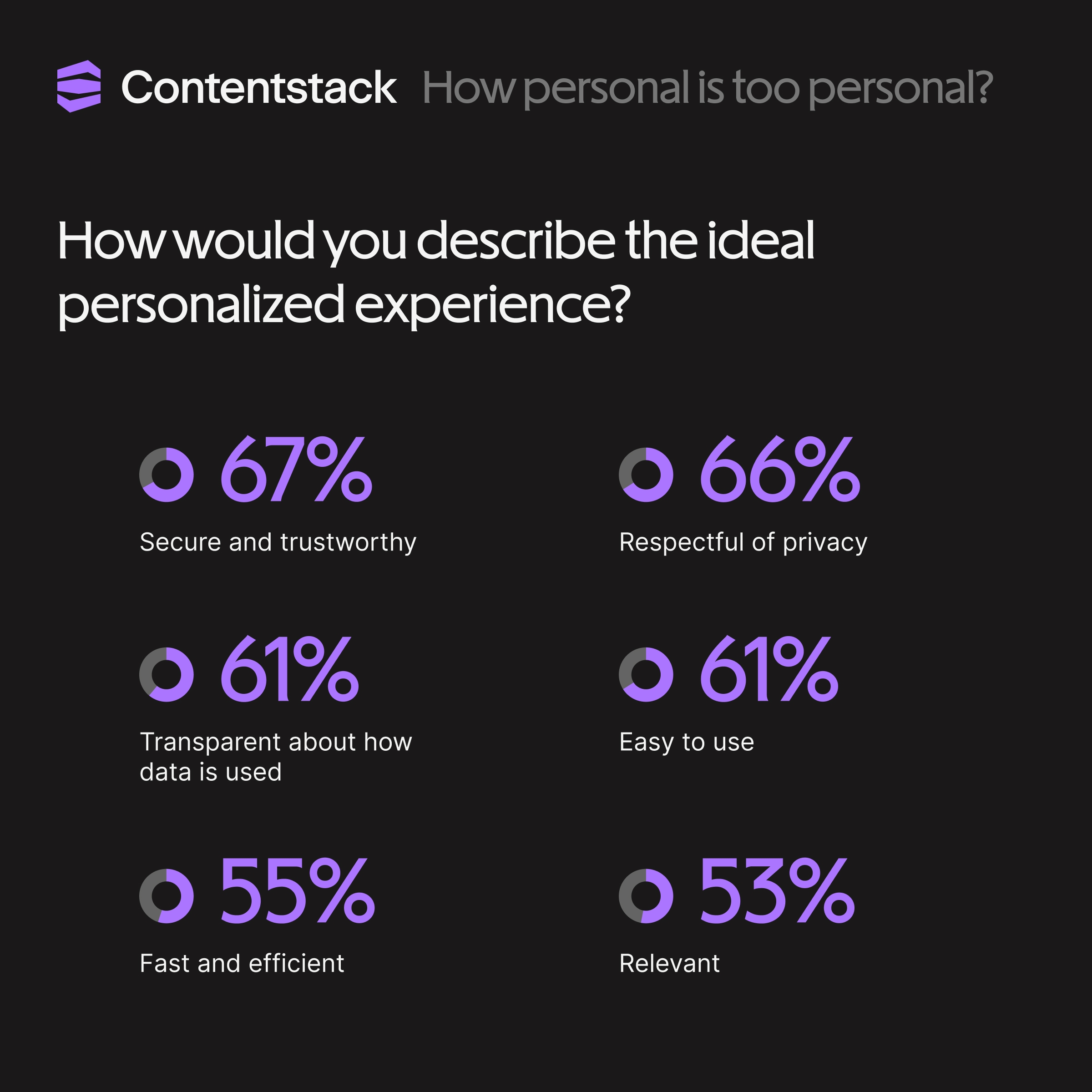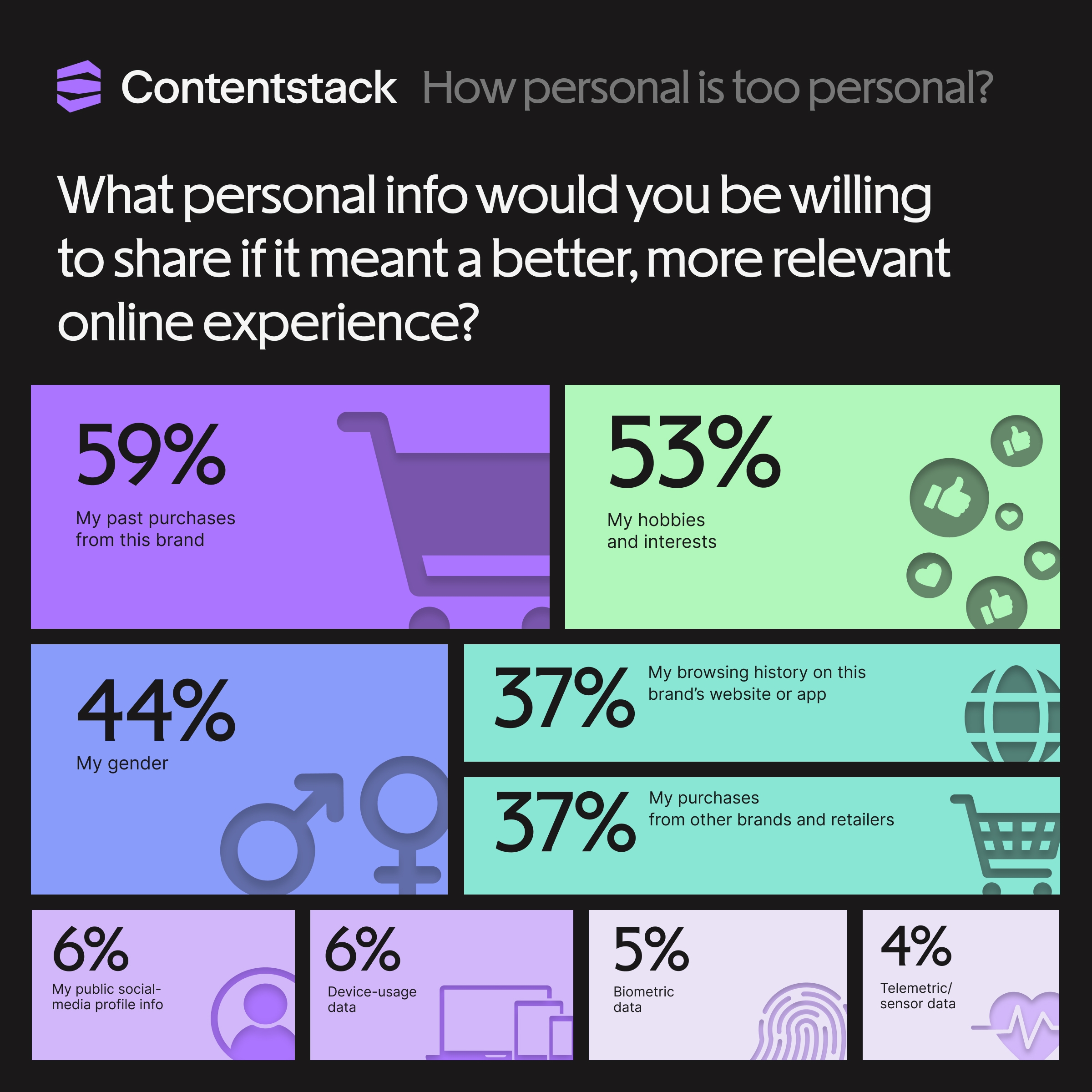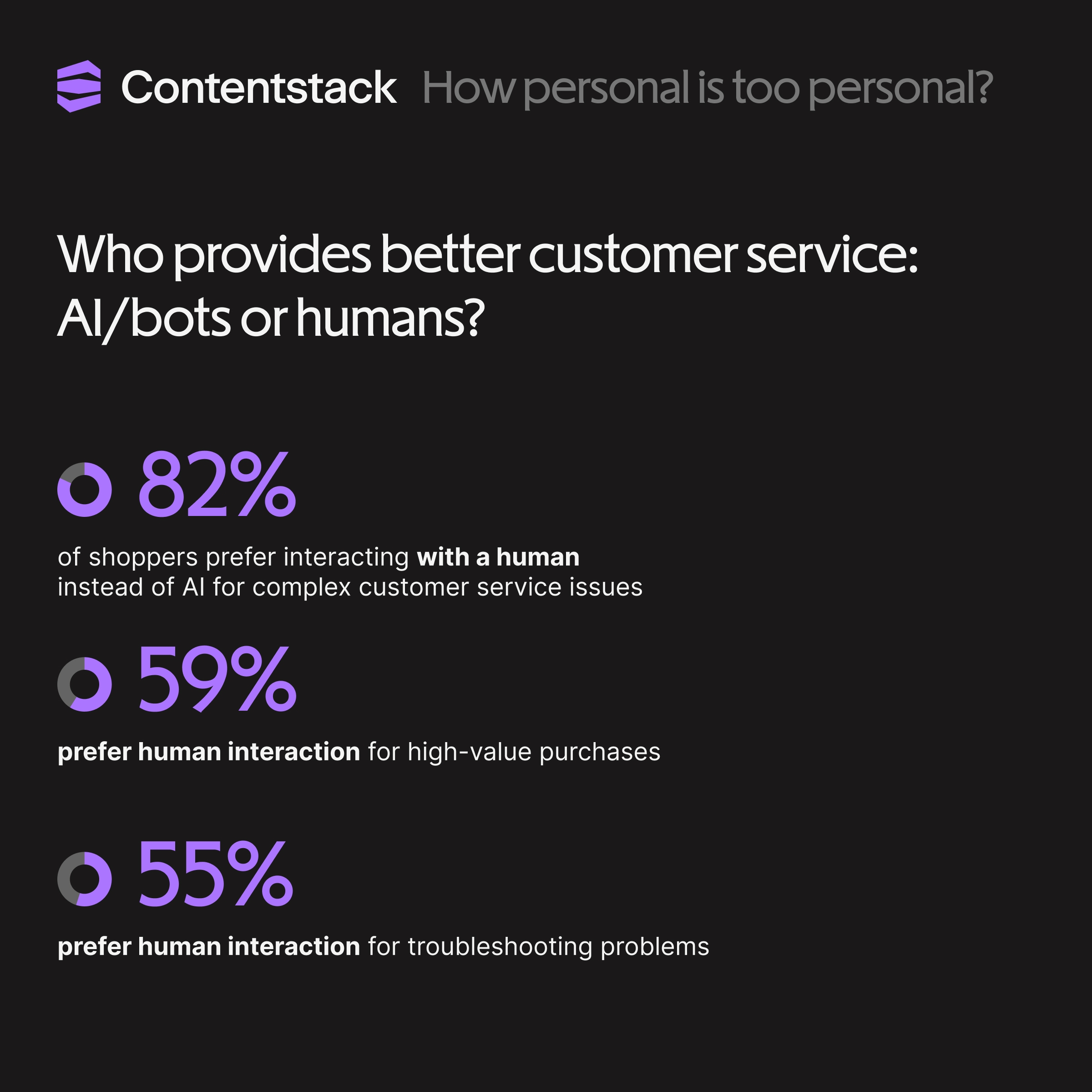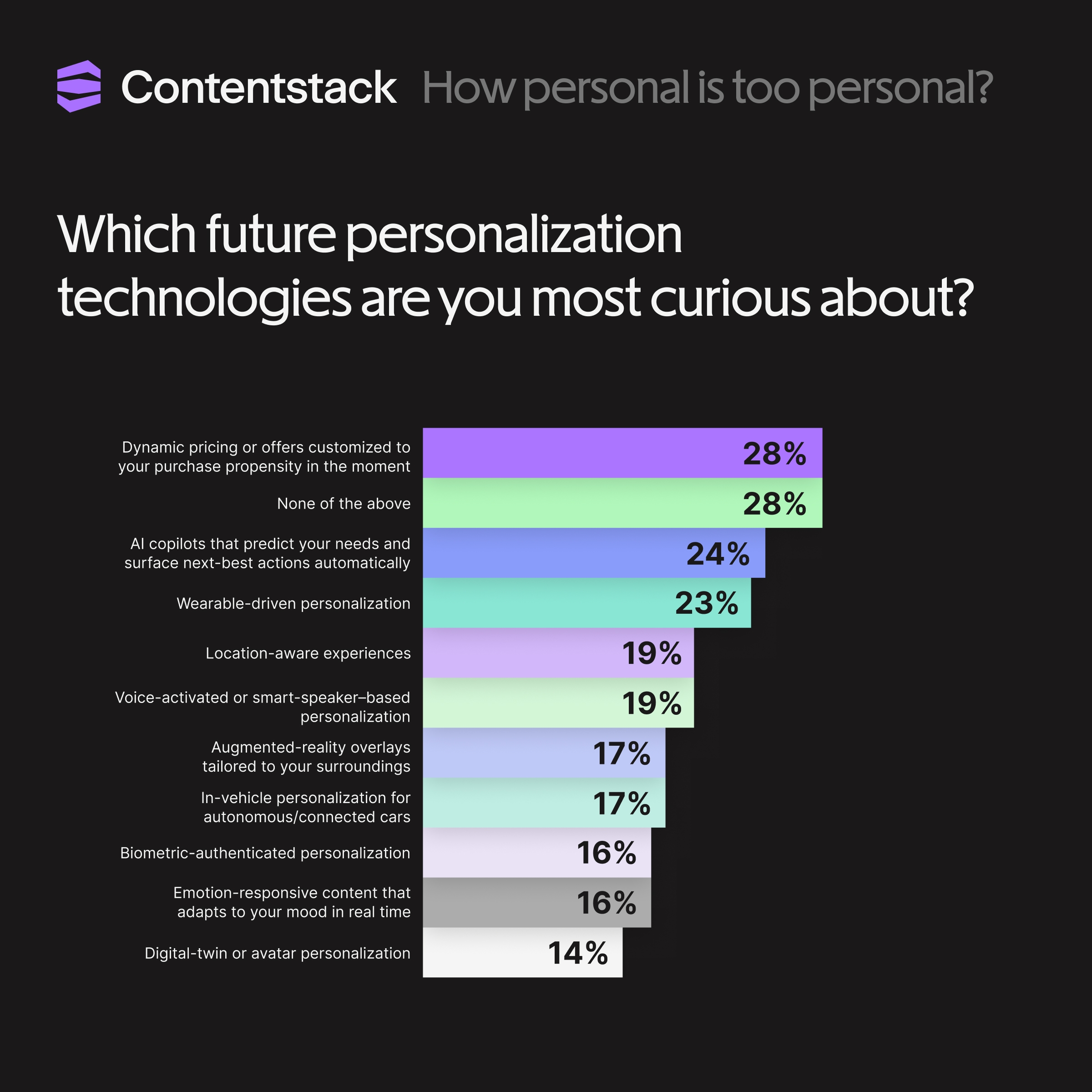57 key stats on personalization and AI experiences from our latest benchmark report

Share

How much do buyers really want brands to know about them? What are the most customer-friendly uses of digital personalization, and what should brands avoid at all costs? Here are the top stats and storylines that emerged from Contentstack's 2025 Personalization report.
Are your personalization efforts driving positive engagement or giving buyers the “ick”?
Contentstack recently asked 628 frequent online shoppers to give us their honest take on personalized experiences, and published a new benchmark report — “How personal is too personal when it comes to digital experiences?” — to guide brands on how to adapt to customer needs without getting too personal.
Here are six key insights we learned from our research:
1) “Ideal” personalized experiences take data privacy seriously.

According to our survey respondents, the most critical elements of a personalized digital experience are that it’s secure and trustworthy (cited by 67% of respondents), respectful of privacy (66%) and transparent about how data is used (61%).
Online shoppers also want personalized experiences that are easy to use (61%), fast and efficient (55%) and relevant (53%).
Still, brands can easily catch their buyers’ attention in the wrong way. Of the 64% of respondents who reported that they experienced personalization that felt invasive or creepy, here’s where it crossed the line:
70% saw an ad for something they were just talking about
51% experienced a brand following up too frequently or persistently
36% received hyper-targeted ads based on their real-time location
35% experienced a brand knowing something about them that they never shared
26% were contacted by a brand without giving their contact info
2) Food and retail experiences top consumers’ wish lists for personalization.
Our report found a significant amount of variance by industry, in terms of where online consumers go to seek out personalized experiences:
- 54% are receptive to personalized online experiences from grocery, food and restaurant delivery brands
- 41% from retail and e-commerce brands
- 41% from media, streaming and entertainment platforms
- 31% from healthcare and wellness providers
- 37% from travel and hospitality brands
- 22% from banking, insurance and other financial services brands
- 17% from telecommunications and internet providers
- And just 8% from business software and SaaS platforms
3) Consumers are willing to share their interests and purchase history, but not data that identifies them personally.

Brands need to tread very carefully when it comes to how they collect and deploy data, as buyers have a limited appetite for sharing their information.
A full 95% of online consumers say that they want to control what data brands collect from them, and 81% report that they’d be more loyal to brands if they were allowed more control over their data.
So what data do consumers feel comfortable sharing in the service of personalized experiences?
- 59% would be willing to share their past purchases from a brand if it meant a better, more relevant online experience
- 53% would share their hobbies and interests
- 37% would even share their browsing history on the brand’s website or app
However, when the data clearly identifies them, they’re less interested in the trade-off.
- Only 6% would be willing to share their public social media profile information if it meant a better, more relevant online experience
- Only 5% would share their biometric data
- Only 4% would share their telemetric or sensor data
4) US-based shoppers are more willing to trade data for personalized experiences than their UK counterparts.
Our survey respondents were split evenly between US residents and UK residents, which revealed that location plays a strong role in consumer receptiveness to personalization.
We found that consumers in the USA are 42% more likely than those in the UK to have felt increased loyalty to a brand from a personalized digital experience, and 44% more likely than those in the UK to say that location-based recommendations improve their shopping experience.
This difference isn’t surprising, given the UK’s stricter data protections like GDPR, compared to the US’s patchwork approach to privacy.
Overall, 45% of our respondents would prefer a personalized online experience that uses some of their data over a non-personalized online shopping experience with full data privacy, but US-based consumers were 25% more likely than those in the UK to say this.
Read the full report here.
5) Online consumers are comfortable with AI-driven digital experiences until they need extensive help.
Our survey respondents expressed openness to the presence of AI in the creation of content and offers, but not as a full replacement for human interaction and support. Of the buyers we surveyed:
79% are comfortable with AI creating product descriptions
72% are comfortable with AI creating marketing messages
60% are comfortable with AI creating customer service chat responses
When asked whether AI/bots or humans provide better customer service, a full 43% of respondents said they’d rather have help exclusively from humans, while 51% said that it depends on the issue, meaning that marketers need to strike a thoughtful hybrid balance of both human and AI support.
Buyers tend to prefer human interaction in situations where they need extensive help:

- 82% of shoppers prefer interacting with a human instead of AI for complex customer service issues
- 59% prefer human interaction for high-value purchases
- 55% prefer human interaction for troubleshooting problems
Still, AI can be a helpful tool in buyer research. 71% of buyers prefer interacting with AI over humans for product recommendations, and Gen Z buyers were 35% more likely than average to say this.
Read the full report here.
6) Consumers aren’t completely sold on the “future” of personalization technology.

Modern brands are thrilled at what new technology can unlock in their quest to engage with buyers, but consumers themselves are slower to catch up.
According to our research, just 24% of shoppers are curious about AI copilots that predict their shopping needs, while 23% are curious about wearable-driven personalization and 19% are interested in voice-acticated or smart speaker-based personalization.
28% of our respondents said they’re not at all curious about future personalization technologies, and Baby Boomers were 70% more likely than average to say this.
In other words, there’s still an “enthusiasm gap” between the high-tech digital experiences that enterprise brands are building and what consumers actually want and expect from shopping experiences.
Read the full report here.
10 fast facts about personalized experiences
According to Contentstack’s 2025 Personalization report:
- 45% of online shoppers actively look for brands that provide personalized digital experiences
- Gen Z buyers are 40% more likely than average to say this.
- 67% of online shoppers say that personalization has helped them discover relevant new products and services
- 46% of online shoppers have felt increased loyalty to a brand due to a positive personalized digital experience.
- However, 64% of our survey respondents have experienced personalization from a brand that felt too invasive or creepy.
- Only 11% of consumers are “very willing” to share their personal data with brands, even if it guaranteed a more relevant personalized experience.
- One in five consumers are “not at all” willing to share their data.
- Baby Boomers were 74% more likely than average to express extreme unwillingness to share more personal data with brands in exchange for more relevant personalization. Gen Z consumers were 152% more likely than average to say they are very willing to share more personal data with brands in exchange for more relevant personalization.
- 82% of shoppers prefer interacting with a human instead of AI for complex customer service issues, but 71% of buyers prefer interacting with AI over humans for product recommendations.
- 75% of the people we surveyed believe that their favorite brands understand what they want as consumers, and 63% believe that AI technology will help brands better understand their buyers’ needs.
For more digital experience industry research and benchmarks, visit contentstack.com/resources.




